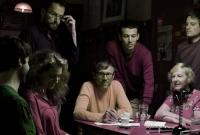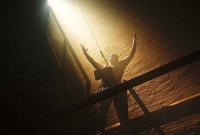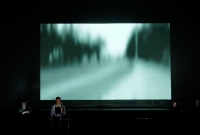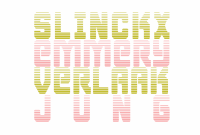Harry Partch : The Wayward
Stephen Graham, MusicalCriticism.com , April 2010
"A fascinating concert, singular even by Ictus' high standards"
(...) So, what we get is lots of transcriptions, some recordings on the original instruments, and some on reconstructed models. This evening we were faced with the first order, transcriptions. Fortunately, the composer Tim Mariëns and Ictus determined that the selected pieces should be transcribed for microtonally-adjusted instruments and not for the regulatory model of equal temperament, which medium often channels Partch. The Wayward (1941 -43), a desperately funny and humane cycle of speech-songs that depict, from the inside, the experiences of hobos travelling the railroads in America in the thirties and forties, provided the material.
The transcriptions were compelling and the performances mostly vivid. Spreading each of the four characterful pieces that make up the cycle across an hour, with a new Mariëns work using the same instruments (and thus the same sound world), Toeënwâs, interpolated amongst them, the concert felt strange, fantastic, and, sometimes, mesmerising. The strangeness comes with the tuning system. At first you wonder at the septimal thirds, feeling the harmonic beatings and unexpected spectra as wonderfully exotic intimations of between-the-notes music. After some time, your apperception shifts decisively into the new regime. Aural conditioning is disregarded, so hypnotised are you by the peculiar and extraordinary patterns and colours. These are the advantages of micro tonality. The disadvantage, I suppose, comes with the system's challenge to conventional notions of tone and timbre, a challenge one or two people in the generally entranced audience clearly ceded to by walking out.
The Ictus flautist Michael Schmid took most of the vocal duties. His rather flat delivery of the opening The Letter robbed the text of some of its caustic humour (the line 'I think I have a job starting the twelfth of October and I truly hope my dear little wife is dead by then' raised nary a chuckle), and I was initially sceptical of Schmid's ability to convey the American idiom of the speech. The deadpan style however had a certain charm of its own - its stark juxtaposition with the quivering, repetitive zither figures from Tom Pauwels and Jean-Luc Plouvier's texture-enriching microtonal piano decorations made for a rich contrast. Schmid was much more impressive in the enduring, eight-part setting of found hitchhiker graffiti (by another hitchhiker - Partch himself), Barstow. Throwing shapes from across the American musical firmament, from barnstorming yankee fanfares to ironic ragtime slides, Plouvier and Pauwels (now on six string, full bodied and microtonally tuned semi-acoustic guitar, often played with a slide) led a riot of music. Sounding alternately like Pierrot Lunaire, Kurt Weill, and Tom Waits (in his dreams), the performance made communicable fragments of lives long lost to poverty and posterity. Schmid presented a varied canvass of emotion and technique; as comfortable with swooping exclamations and pulsing tension as he was with wise ass jeering, the vocalist totally commanded the attention. Pauwels, too, deserves special credit for navigating the cumbersome fretboard of his guitar with such fluency (even if the odd note was fluffed).
The following San Francisco, with Pauwels back on zither, gave us more of the same earthy character, only condensed to vibrant rhythmic and cyclic chants that nevertheless would not repay lengthy exposition (I have to say that following the earlier redolence of Tom Waits, San Francisco put me in mind of Steve Reich's Different Trains, a lauded piece that was here showed up as derivative and somewhat pallid). Mariëns' Toeënwâs followed. Featuring a welter of interesting ideas — including an opening reed organ wheeze straight out of Nico's Lawns of Dawns, and a series of interesting sonorities achieved by subtle management of the unique colours of the ensemble &madsh; the work meandered somewhat, a little unsure what to do with its material. The sudden interjection of quiet, cascading, distorted guitar lines at the end, though pretty and ear-catching in themselves, seemed symptomatic of the slight gaucheness of the work's form and argument.
In Toeënwâs and the following U.S. Highball, Schmid proved as responsive and pointed a flautist as he was a vocal artist. Gerrit Nulens on microtonal marimba and percussion widened out the palette skilfully in these two concluding works likewise. Highball, with its incessant cries of 'LEAVING…!', is something of a hard listen, but this evening's multicoloured version is certainly preferable to the Kronos Quartet's committed but misdirected 2003 Nonesuch recording with David Barron. Sharing out the vocal duties for this finale between the four musicians proved damaging; Plouvier's resolutely Walloonian brogue actually charmed, but every time Nulens took over the standard fell significantly, with metric and idiomatic concentration becoming diluted. Some excellent effects were however achieved by the combinations of voices, particularly in the quick swapping between Schmid, Plouvier, and Pauwels. Generally, though, as with earlier, the musicians' skill and dedication to the difficult charge asked of them was remarkable; Partch's funny, strange and compassionate empowerment of hobo voices came ably and vividly through the transcriptions and the performances. This was a fascinating concert, singular even by Ictus' high standards.
Stephen Graham
Harry Partch : The Wayward April 27th 2010, Knack, Lucas Huybrechts
Ictus speelde waarschijnlijk het meest bizarre concert van het seizoen. De jonge musicus-componist-musicoloog Tim Mariën stootte bij toeval op het werk van het buitenbeetje van de Amerikaanse muziek, op Harry Partch. De troubadour van de grote depressie. Als ooit het woord eigenzinnig op zijn plaats was, is het wel hier. “The Wayward”. was meteen ook de titel van cyclus van liederen (?) die Tim Mariën voor het ensemble speelklaar maakte.
Zelfs onder musicologen is de Amerikaanse componist Harry Partch (1901 – 1974) een illustere onbekende. Dat heeft natuurlijk alles met zijn karakter te maken. Partch was een loner. Hij trok consequent zijn conclusies en is gaan zwerven. Trein op, trein af zwierf hij door het Amerika van de depressie. Je kan hem als een voorloper van de beatgeneratie beschouwen. Zoals het in “On the road” van Jack Kerouac is beschreven. Of misschien nog preciezer: hij zou één van de figuren uit de boeken van John Steinbeck kunnen zijn.
Dat hij zwierf wil niet zeggen dat hij zijn scherpe verstand zou kwijtgeraakt zijn. Hij had een intellectuele achtergrond. Hij had universiteit gelopen. Daar ontdekte hij dat het gelijkzwevende octaaf in feite vals klonk. Vandaar ook de naam gelijkzwevend. Om het allemaal harmonisch te laten klinken ontwierp hij octaven die niet uit twaalf, maar uit drieënveertig noten bestonden. Om die noten te kunnen realiseren bouwde hij buitenissige instrumenten. Harpen, snaarinstrumenten xylofoons. Onder andere één waarvan de laagste noot opgewekt werd door een houten blok van anderhalve meter hoog. Waardoor muziek heel fysiek werd. Dat was voor hem essentieel. Muziek moest een impact hebben. Mocht niet een intellectuele spielerei zijn zoals bij Bach.
Zijn melodievoering is een kruising van het recitatief en uitzonderlijk een schuchtere aanzet tot lyrische expressie. Daarmee realiseert hij hetzelfde als Leo Janacek op hetzelfde moment aan de andere kant van de wereld doet. Die luisterde naar de muziek in gewone conversaties. En hij noteert die. Naderhand componeert Partch die muziek uit. Steve Reich zal later dat procédé overnemen, in onder andere het muziektheaterwerk “The Cave”.
De teksten waarmee hij werkt zijn objets trouvés, flarden mededelingen van eenzame zwervers. “It’s January twenty-six. I’m freezing. Ed Fitzgerald, Age nineteen. five ten inches, black hair, Brown eyes. Going home to Boston Massachusetts, It’s four p.m. and I’m hungry and broke. I wish I was dead. But today I am a man”. Ondanks de schraalte van de woorden, toch een hele wereld. Die teksten worden gezongen. Maar het meest nog zet de begeleiding je op de verkeerde voet. Door de eigenzinnige stemming van de instrumenten klinkt ze in onze oren schril, vals, tegendraads. Groot respect voor de zanger Michael Schmiddie deze wereldvreemde muziek standvastig wist te vertolken. En was het zo vreemd? Het publiek van het Kaaitheater – dat wel openstaat voor experimenten ging mee in deze duizelingwekkende rit. het bleef zitten, op één verdwaalde oude man na.
Ictus is een heerlijk ensemble. Ze verlaten de vertrouwde paden. Niet om in het andere circuit van de gestandaardiseerde hedendaagse muziek te belanden, ze kiezen radicaal voor avontuur. Om de muziek van Partch te realiseren zullen ze langdurig en hard hebben moeten werken. Om het dan uit te voeren voor een relatief klein publiek dat wel zeer dankbaar was na afloop. Als bonus kregen wer nog een compositie van partch-adept Tim Mariën. Helemaal in de geest van de leermeester. En even was België prachtig.
(Lucas Huybrechts)
Harry Partch : The Wayward April 27th 2010, Knack, Lucas Huybrechts
(ENG translation)
Ictus has probably played the most bizarre concert of the season. The young musician-composer-musicologist Tim Mariën stumbled upon the work of the maverick of American music, Harry Partch.
He was the troubadour of the great depression. The word wayward has never been more appropriate. And “The Wayward” was also the title of the series of songs (?) that Tim Mariën prepared for this ensemble.
American composer Harry Partch (1901 – 1974) is an illustrious unknown, even amongst musicologists. This of course is all because of his character. Partch was a loner. He roamed about from place to place and drew his own conclusions.
Getting on and off trains, he wandered through the America of the great depression. He can be considered to be a forerunner of the beat generation, just like it is described in “On the Road” by Jack Kerouac. Or perhaps even more accurately, he could have been a character from one of John Steinbeck’s books.
The fact that he drifted from place to place does not mean he lost his sharp mind. He had an intellectual background. He went to university. This was where he discovered that the equal temperament scale didn’t actually sound right, hence the name: equal temperament.
To make it all sound in harmony, he designed scales with forty-three notes instead of twelve. And he constructed peculiar instruments to produce these notes: harps, stringed instruments, xylophones. One of these xylophones produces its lowest note using a wooden block that is a metre and half long. This makes music become very physical. And this was essential for him. Music had to have an impact. It shouldn’t be an intellectual fiddling around such as it is with Bach.
His melodies are a cross between the recitative and exceptional, a tentative initiative at lyrical expression. With this he realises the same thing that Leo Janacek was doing at the same time on the other side of the world. Janacek listened to music in normal conversations, and noted them down. Partch later composed music from this. Steve Reich would take over this process later, amongst other things in the work of musical theatre “The Cave”.
The texts he worked with were found objects, fragments of communication from lonesome drifters. “It’s January twenty-six. I’m freezing. Ed Fitzgerald. Age nineteen. Five feet ten inches. Black hair. Brown eyes. Going home to Boston Massachusetts, It’s four p.m. and I’m hungry and broke. I wish I was dead. But today I am a man.”
Despite the poverty of the words, it is nevertheless a complete world. These texts are sung. But the accompaniment is still mostly on the wrong foot. The wayward tuning of the instruments makes them sound false, wrong and awkward to our ears. Great respect goes to the singer Michael Schmid who single-mindedly knew how to interpret this other-worldly music.
And was it so strange? The audience at the Kaai theatre – which is very open to experiments – went along on this dizzying ride. It stayed seated, like a lost old man.
Ictus is a wonderful ensemble. It strayed from familiar paths. Not to land in another circuit of standardised contemporary music, it radically opted for adventure. It had to work long and hard to recreate Partch’s music, and then execute it for a relatively small audience that was very appreciative after the performance. As a bonus we were then given another composition by Partch disciple, Tim Mariën. Wholly in the spirit of the master. And Belgium was wonderful for a while.
(Lucas Huybrechts)
Harry Partch : The Wayward April 27th 2010, Knack, Lucas Huybrechts
(traduction FR)
Ictus nous a donné ce que l'on peut sans doute qualifier de concert le plusbizarre de la saison. Le jeune musicien-compositeur-musicologue Tim Mariën a découvert par hasard l'œuvre du "bâtard" de la musique américaine, à savoir Harry Partch.
Le troubadour de la grande dépression. S'il est un contexte dans lequel le terme "opiniâtre" prend tout son sens, c'est bien celui-ci. “The Wayward” était également d'emblée le titre du cycle de chants (?) que Tim Mariën a préparés pour l'ensemble.
Le compositeur américain Harry Partch (1901 – 1974) est un illustre inconnu, même dans l'univers des musicologues. Bien entendu, son caractère n'y est pas étranger, loin s'en faut. Partch était un solitaire. Conséquent avec lui-même, il tira ses conclusions et s'en fut vivre vagabond.
De train en train, il erra à travers l'Amérique de la Dépression. On peut sans conteste le considérer comme un précurseur de la Beat Generation. C'est en tous cas la description qu'en donne Jack Kerouac dans “On the road”. Ou mieux encore : il pourrait être l'un des personnages des ouvrages de John Steinbeck.
Son passage à la condition de vagabond ne signifie aucunement qu'il en perdit son bon sens. Il venait d'un monde intellectuel. Il est allé à l'université. C'est là qu'il découvrit que la gamme tempérée, en réalité, sonnait faux - d'où, d'ailleurs, le terme "tempérée".
Pour insuffler une harmonie à l'ensemble, il créa des octaves composées non pas de douze, mais de quarante-trois notes. Afin de pouvoir donner vie à ces notes, il fabriqua ensuite des instruments excentriques, tels que des harpes, des instruments à cordes, des xylophones. L'une des notes les plus basses, notamment, fut produite par un bloc en bois d'un mètre et demi de haut. La musique devint ainsi très "physique". Pour lui, il s'agissait d'un élément essentiel. La musique devait avoir un impact, et ne pas être seulement un jeuintellectuel comme chez Bach.
Sa doublure mélodique est un croisement du récitatif et, exceptionnellement, d'une timide ébauche d'expression lyrique. Ce faisant, il réalise la même chose que Leo Janacek, au même moment, de l'autre côté du globe. Ce dernier écoutait la musique qui émanait des conversations de tous les jours. Et il prenait des notes. Partch composait cette musique après-coup. Steve Reich reprendra ultérieurement ce procédé à son compte, notamment dans l'œuvre musicothéâtrale, “The Cave”.
Les textes avec lesquels il travaille sont des 'objets trouvés', des fragments de phrases de vagabonds solitaires. "Nous sommes le 26 janvier. Je meurs de froid. Ed Fitzgerald, dix-neuf ans, 1,78 m, cheveux noirs, yeux marron. Je rentre à la maison. Boston, Massachusetts. Il est quatre heures de l'après-midi. J'ai faim et je suis fauché. Je préférerais être mort. Mais aujourd'hui, je suis un homme".
Malgré la pauvreté des mots, on entrevoit tout de même le monde dont on parle. Et quel monde … Ces textes sont chantés. Mais plus encore, l'accompagnement vous met sur une voie diagonale. Le caractère buté des instruments fait tinter une musique perçante, fausse, comme à rebours. Chapeau bas au chanteur Michael Schmid, qui a su traduire avec ténacité cette musique déphasée.
Au fond, était-ce si bizarre? Le public du Kaaitheater, qui est très ouvert aux expériences, est complètement entré dans ce voyage vertigineux. Il est resté assis, à l'exception d'un vieil homme perdu.
Ictus est un ensemble extraordinaire. Ils sortent des sentiers battus et optent résolument pour l'aventure, sans pour autant tomber dans l'autre circuit, celui de la musique contemporaine standardisée. Pour donner vie à la musique de Partch, ils doivent assurément avoir beaucoup travaillé. Et longtemps. Pour la jouer ensuite devant un public relativement réduit, mais particulièrement reconnaissant. Et en bonus, nous régaler encore d'une composition d'un invétéré "partchomane", Tim Mariën. Tout à fait dans l'esprit du maître. Et l'espace d'un instant, que la Belgique était belle!
Lucas Huybrechts
HARRY PARTCH arr. Tim Mariën, The Wayward, Vorarlberger Nachrichten,
August 2011, Veronika Fehle
There is music on the streets, you just have to listen for it. The first “Art of our Times” (KAZ) festival concert provided the ideal opportunity. All aboard! The train is departing! No, you're not on a station platform, but still in the Bregenz Festival Opera House's lakeside studio. And while you were on the right track acoustically as a fully loaded freight train will soon be trundling across the stage, this is nothing more than the prelude to the “Art of our Times” (KAZ) concert which is performing for the first time in Austria with “The Wayward.”
Hitting exactly the right note
Nothing less was expected from the festival's contemporary programme. Freight trains and rumbling sounds but absolutely no disrespect is intended. With the US composer Harry Partch (1901-1974), Belgium's Ictus Ensemble and the Belgian composer Tim Marien (born 1975), exactly the right note is being hit. How come? Well, firstly, because Harry Partch spent the most creative period of his life as a vagabond hiding away on the freight trains of the American railroads. On the other hand, because you can hear this restlessness - and that is exactly what the railway represents here - in Partch's music note for note. Partch's four-part work “The Wayward”, which has been split into two halves in Bregenz with Tim Mariens' “Toeenwas”, reflects a vagabond's world of sound.
Significantly more keys
But firstly let's look at the main aspects. Harry Partch's unconventional lifestyle has already been mentioned. However, the fact that he set out in search of the USA's most quintessential music, that he came to the conclusion that this could not be reflected with conventional musical instruments and therefore became an instrument maker himself still holds great interest. It should therefore come as no surprise, for example, to see a piano on stage which has many more than the customary 88 keys. Tim Marien followed in Partch's footsteps for “The Wayward” and has adapted his “Toeenwas” perfectly to the American composer's tonal range in terms of sound and style.
But now to the music which imitates the tumultuousness of the steam engine, draws a sound image from the cries of the newspaper boys and quotes from a vagabond's letters. The choice of the Belgian Ictus Ensemble has also proven a piece of good fortune. Do Michael Schmid, Gerrit Nulens, Tom Pauwels, Daniel Ploeger and Jean-Luc Plouvier seem unhappy about exploring Partch's world of notes? On the contrary, they embody the music whether with vocals, the flute, the zither, banjo, trombone or microtonal organ.
It sounds so different now, but you can hear the restless train, the wisdom of the vagabond, the cries of the newspaper boys on bicycles and the unconventional life of people on the fringes of well-heeled society.
A standing ovation
You hear America and cannot escape the feeling that Harry Partch has succeeded in perfectly capturing the music of the USA somewhere between references to traditional folk songs and the roar of the trombone. And this is underlined by the standing ovation that everyone received. It's now full speed ahead on the “Art of our Times”
(KAZ) express.





